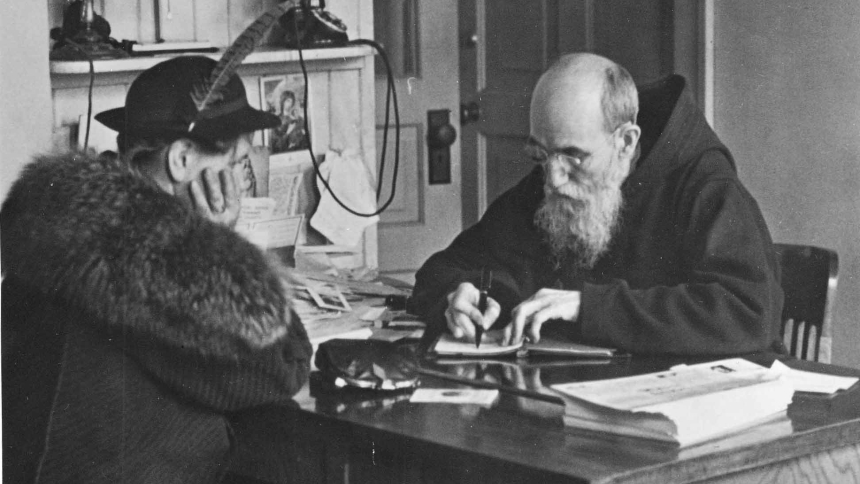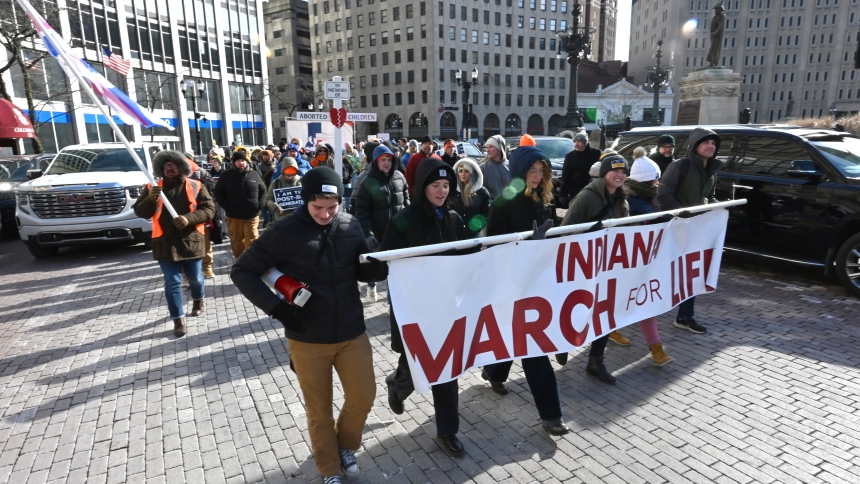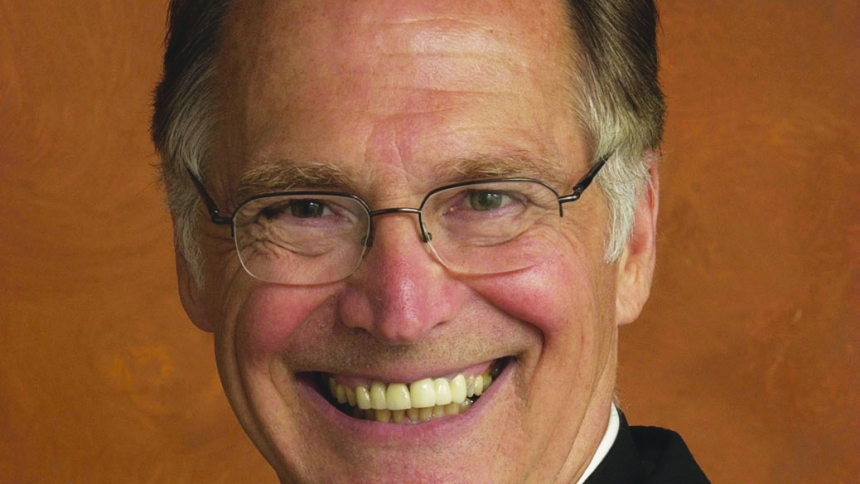
(OSV News) - Though Blessed Solanus Casey died many decades ago, Detroit has never forgotten the Capuchin Franciscan priest, whose feast day is July 30. Authentic and approachable, Father Solanus (1870-1957) was a soft-spoken friar and son of Irish immigrants. He loved hot dogs with onions, shooting pool, family reunions and practical jokes. He was devoted to the Detroit Tigers.
Most of all, as others knew, he loved God and helping others. In 1929, four days after the stock market crash, Father Solanus helped start a soup kitchen. All too soon, as automobile factories closed, it was feeding between 1,500 and 3,000 people a day. Even with this great legacy, in the eyes of many it was undoubtedly his ministry of prayer and healing that made him a saint.
However, it requires more than a legacy and life devoted to prayer and healing to be officially recognized by the church as a blessed or saint. On May 4, 2017, speaking to an excited and joyous crowd at the Solanus Casey Center in St. Bonaventure Monastery in Detroit, Archbishop Allen H. Vigneron explained that the miracle needed for the beatification of Solanus Casey had been approved in September 2016 by the Holy See's Congregation for the Causes of Saints.
The miracle involved a foreigner, a woman with an incurable, congenital skin disease. She was visiting friends in Detroit and asked to go to the Solanus Center to pray at the tomb of Father Solanus. She wanted to pray for others who needed healing. While praying, she heard a voice within saying, "Pray for yourself." She did, and was instantly cured of a lifelong skin ailment.
Back in her own country, she went to five doctors. They all agreed that there was no scientific explanation for her cure. She wished to remain anonymous for a time, the archbishop said, because she didn't want to draw undue attention to herself - a consideration that mirrored Father Solanus' own qualities.
Bernard Francis Casey Jr. was born Nov. 25, 1870, in Oak Grove, Wisconsin. "Barney" was the sixth child of Ellen and Bernard Casey Sr., and, after three boys, the couple decided to give this son his father's name -- Bernard Francis. More Casey children followed, and eventually there were 16 children in the close-knit Casey clan. They farmed on the Midwestern frontier, and every young Casey child helped to support the family.
Farming was a risky business, and the nightly Casey family rosary often ended with prayers for good harvests and protection from prairie fires, locusts and drought.
There was a spiritual depth in Barney that stood out, even in his large, busy family. He was deeply committed to prayer, especially the rosary. At the same time, he was witty, handsome, athletic and strong. He was a fearless catcher for family baseball games, but he wouldn't participate in the amateur boxing matches his brothers organized, apparently because he didn't like the idea of hitting and hurting an opponent.
At 18, he fell in love with Rebecca Tobin. After he proposed marriage, Rebecca's mother refused to give her consent and sent Rebecca away to boarding school. Shaken and sad, Barney continued working for some years as a streetcar conductor, first in Stillwater, Minnesota, and later in Superior, Wisconsin. And yet he remained unsettled.
After years of prayer and soul-searching, Barney felt that God was calling him to be a priest. He entered the seminary of the Archdiocese of Milwaukee but had to leave because of academic problems. At age 26, he entered the seminary again in Detroit, joining the Order of Friars Minor Capuchin, a branch of the Franciscan order.
Since the seminary faculty spoke mostly German, Barney was at a disadvantage again. His superiors were eventually concerned with his theological knowledge and understanding. When ordination finally came in 1904, he was ordained as a simplex priest. He couldn't exercise the priestly faculties of hearing confessions or preaching homilies - ordinary responsibilities for a parish priest.
What limitations these were for a 34-year-old priest who wanted to give everything to God! Though it surely humiliated him, Father Solanus was completely obedient and ready for any role. His first pastoral assignments were at Capuchin parishes in New York. Solanus was given simple jobs: acting as doorkeeper, training altar boys, serving as sacristan, moderating the Ladies Sodality.
Ironically, parishioners were soon drawn to Father Solanus -- finding that the doorkeeper was compassionate, wise and patient -- and sought his pastoral care. Unburdened by the usual responsibilities of a parish priest, he had time to listen. God used that. Within a year or two, the lines of visitors wanting to talk with the doorkeeper about their family, medical and financial problems were long -- every day.
In New York parishes and later back at St. Bonaventure Monastery in Detroit and at St. Felix Friary in Huntington, Indiana, Father Solanus reminded people that he couldn't hear confessions. He did assure them of God's mercy and unbounded love. "Thank God ahead of time," he counseled. "His plans for us are always the best."
As well as providing a listening ear, Father Solanus continued to demonstrate his devotion to prayer, healing and the church. He asked those who could afford it to make a contribution to the Capuchins' Seraphic Mass Association, which supported Capuchin missions around the world. While Father Solanus was still in New York, his Capuchin superiors asked him to keep a record of prayer requests. He also took notes when a healing or an unexplainable turn of events was reported.
Eventually, Father Solanus filled seven ledger-style notebooks with notes on more than 6,000 "cases." On about 700 of those case notations, he later went back and added amazing endings. Among them:
"Papa went to confession and Holy Communion for the first time in 49 years," Solanus penned at the end of an entry about a woman asking for prayers for her father who had left the Church.
"Walking out of the monastery without assistance" followed his notations on a 46-year-old man who suffered a fractured skull and broken back several weeks earlier in a car accident. The man was carried in to see Father Solanus.
"Declared entirely cured July 2 without having any operation." Father Solanus added that note to data recorded about 59-year-old Bertha Smith, who had been diagnosed with stomach cancer. She had already had four operations at Detroit's Ford Hospital.
As the decades moved by, Capuchin authorities tried to reduce demands made on Father Solanus. He was getting old and rarely got more than five hours of sleep a night. To the frustration of his superiors trying to ease his burdens, Father Solanus always found it hard to turn away hurting and needy people.
A terribly painful skin disease plagued Father Solanus in his last years. In the summer of 1957 he was hospitalized. On the morning of July 31, he sat up and stretched out his arms as if on the cross. "I give my soul to Jesus Christ," he said before falling back and taking his last breath. Father Solanus was 86. Around 20,000 people came to the doorkeeper's wake and funeral.
In 2017, Father Casey was beatified in Detroit. Beatification moves the priest, declared venerable in 1995, much closer to sainthood through the church's official canonization process. Father Casey is one of the currently few native-born North Americans to be beatified.
Today, people come from all over the world to see his tomb, where they leave tiny slips of paper with prayer requests. He is a model for the value of caring and continues to teach us the power of listening.
Caption: Blessed Solanus Casey is pictured taking a note from a woman who visited him at St. Bonaventure Monastery in Detroit in 1941. The Capuchin Franciscan friar kept dozens of notebooks filled with prayer requests and favors from the thousands who visited him each year. (OSV News photo/Archdiocese of Detroit)



